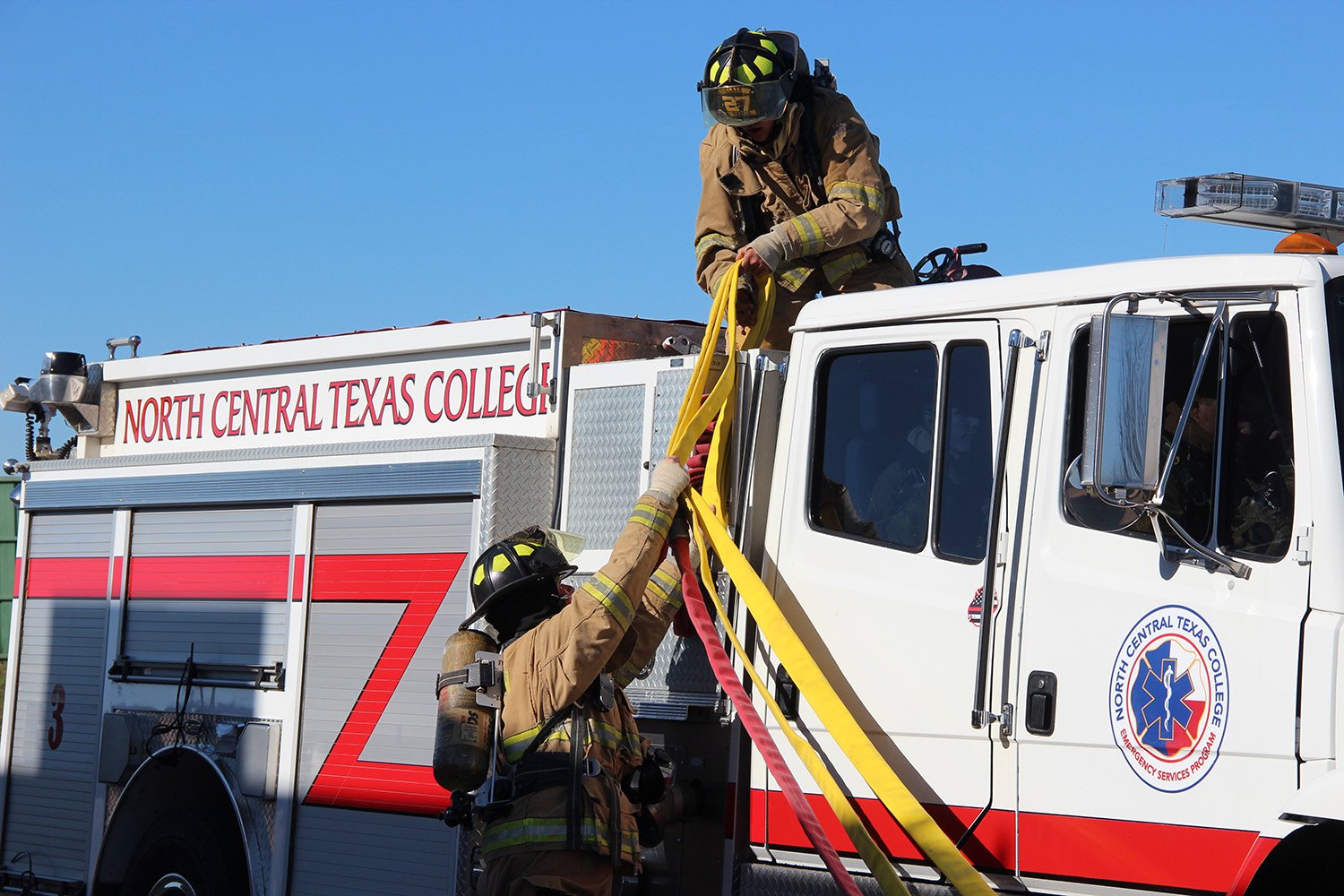
Fire Science
The Basic Fire Academy is designed to give the student a well-rounded education for a professional career in the fire service.
> PROGRAMS > HEALTH SCIENCES > FIRE SCIENCE
Firefighters control and put out fires and respond to emergencies involving life, property, or the environment. On the scene of a fire or other emergency, their work may be dangerous. On call at fire stations, firefighters sleep, eat, and perform other duties during shifts that often last 24 hours. Most work full time.
Following the successful completion of the Fire Science program, you’ll be able to enact the desirable qualities of a basic firefighter that contribute to high professional and ethical standards. You’ll function effectively during high stress situations which may include physical exertion, intense environments, victim rescue, life support treatments, victim rescue, and fire suppression. You’ll be able to coordinate scene management during hazardous situations, communicate with first responders, agencies, patients, victims, and the public, and document, written and oral communications, events relative to emergency care, rescue, and fire incidents.
Courses are taught through lecture, written assignments, skills demonstrations, and hands-on training. Clinical experiences and Internships are completed through local fire departments.
NCTC Dual Credit Fire Science receives award for excellence.
The Dual Credit Fire Science program was presented with a 2021 Program of Excellence award at the 2021 Texas Association of College Technical Educators (TACTE) virtual conference. Fire Science Instructor and Program Chair Strider Floyd accepted the award on behalf of the department. Floyd credited the success of the program to the support they have received from not only NCTC administration, but also from the local school districts and fire departments.
“Our biggest asset, though, would be our instructors,” said Floyd. “They are all currently working in the field across North Texas and bring hands-on experience to the classroom.”
Admissions Steps
Step 1: Apply to NCTC.
Step 2: Attend an EMS & Fire Science information session.
Once all admission requirements are met, you will be notified by the Admissions Office of your acceptance to NCTC. You will need to schedule an information session by contacting:
Claudia Leuschner
Emergency Services Administrative Assistant
(940) 498-6237
cleuschner@nctc.edu
Step 3: Register for the HESI Entrance Exam.
HESI testing information will be sent after you sign up for an information session. The candidates that pass the HESI Exam will be invited to the Physical Ability Exam. Once testing is done you can complete and submit an online EMS & Fire Science Application.
Step 4: Apply to the EMS & Fire Science program.
Login to the MyNCTC
Under Student Services, select EMS & Fire Science Application.
Fill out the form and attach copies of your transcripts.
Once you have completed all sections of the application along with your HESI test scores, submit your application.
After applications have been processed, you will be notified by email of your status in the EMS & Fire Science program.
Criteria for Enrolling into the Fire Program
Must have a social security number.
Must be at 18 years old.
Must be a high school graduate or have a GED.
Must have medical insurance (can be purchased through agencies that work with NCTC).
Step 5: If accepted to the program, you will need to complete...
Drug Screen
Physical
Physical Agility Exam Waivers
CPR Certification (Healthcare Provider only)

Degrees
You may choose to earn a Certificate or an Associate of Applied Science (AAS) Degree in Fire Science or an AAS Degree in Fire Administration from NCTC. Courses from the Certificate Program will readily transfer to the Degree programs.
Degree Plans
Basic Firefighter Certificate
Courses are taught through lectures, written assignments, skills demonstrations, and hands-on training. Clinical experiences and Internships are completed through local fire departments. Following successful completion of the program, the graduate will be able to:
Demonstrate the desirable qualities of a basic firefighter that contribute to high professional and ethical standards.
Function effectively during high-stress situations. Such situations may include physical exertion, austere environments, victim extrication, basic or advanced life support patient treatments, victim rescue, and fire suppression.
Coordinate scene management during hazardous situations.
Establish rapport with first responders, agencies, patients, victims, and the public.
Concisely document through written and oral communications, events relative to the provision of emergency care, rescue and fire incidents.
Courses and credit hours () required to earn the Basic Firefighter Certificate.
First Semester
FIRS 1203 FIREFIGHTER AGILITY AND FITNESS PREPARATION — (2)
FIRS 1301 FIREFIGHTER CERTIFICATION I — (3)
FIRS 1313 FIREFIGHTER CERTIFICATION III — (3)
FIRS 1319 FIREFIGHTER CERTIFICATION IV — (3)
FIRS 1323 FIREFIGHTER CERTIFICATION V — (3)
FIRS 1329 FIREFIGHTER CERTIFICATION VI — (3)
FIRS 2188 INTERNSHIP-FIRE PROTECTION AND SAFETY TECHNOLOGY/TECHNICIAN — (3)
Total credit hours for this semester — (18)
Total credit hours — (24)
Fire Science AAS
Fire Science degree is designed for individuals employed in fire service who want to further enhance their career through expanded experience and/or education. Courses are taught through lectures, written assignments, skills demonstrations, and hands-on training. Clinical experiences and Internships are completed through local fire departments. Following successful completion of the program, the graduate will be able to:
Demonstrate the desirable qualities of a basic firefighter that contribute to high professional and ethical standards.
Function effectively during high-stress situations. Such situations may include physical exertion, austere environments, victim extrication, basic or advanced life support patient treatments, victim rescue, and fire suppression.
Coordinate scene management during hazardous situations.
Establish rapport with first responders, agencies, patients, victims, and the public.
Concisely document through written and oral communications, events relative to the provision of emergency care, rescue and fire incidents.
Courses and credit hours () required to earn the Fire Science AAS.
First Semester
FIRS 1203 FIREFIGHTER AGILITY AND FITNESS PREPARATION — (2)
FIRS 1301 FIREFIGHTER CERTIFICATION I — (3)
FIRS 1313 FIREFIGHTER CERTIFICATION III — (3)
FIRS 1319 FIREFIGHTER CERTIFICATION IV — (3)
FIRS 1323 FIREFIGHTER CERTIFICATION V — (3)
FIRS 1329 FIREFIGHTER CERTIFICATION VI — (3)
FIRS 2188 INTERNSHIP-FIRE PROTECTION AND SAFETY TECHNOLOGY/TECHNICIAN — (3)
Total credit hours for this semester — (18)
Third Semester
ENGL 1301 COMPOSITION I or ENGL 2311 TECHNICAL WRITING — (3)
FIRT 1307 FIRE PREVENTION CODES & INSPECTIONS — (3)
FIRT 1309 FIRE ADMINISTRATION I — (3)
MATH 1314 COLLEGE ALGEBRA or MATH 1324 MATHEMATICS FOR BUSINESS & SOCIAL SCIENCES or MATH 1332 CONTEMPORARY MATHEMATICS or MATH 1342 ELEMENTARY STATISTICAL METHODS — (3)
PSYC 2301 INTRO TO GENERAL PSYCHOLOGY — (3)
Total credit hours for this semester — (15)
Total credit hours — (60)
Fire Administration AAS
Fire Administration degree prepares students for leadership positions within the fire service. Introductory and advanced courses emphasize:
Administration, management, and leadership of municipal fire services
Fire protection and prevention strategies
Fire investigation
Community and political dimensions of fire service administration
This degree can be completed in a mix of face-to-face classes and online classes. Courses are taught through lectures, written assignments, skills demonstrations, and hands-on training. Clinical experiences and Internships are completed through local fire departments. Following successful completion of the program, the graduate will be able to:
Demonstrate critical, professional, and personal skills such as independent thinking, communication skills (oral, written, and listening), ability to work effectively within groups, and a commitment to continuous learning
Demonstrate strong problem solving and creative thinking skills
Lead and manage organizational change with a demonstrated understanding of its impact on budgets and human resources
Interpret the scope of the authority and responsibility of all levels of administration and interact appropriately within the organization and external community
Courses and credit hours () required to earn the Fire Science AAS.
First Semester
FIRS 1203 FIREFIGHTER AGILITY AND FITNESS PREPARATION — (2)
FIRS 1301 FIREFIGHTER CERTIFICATION I — (3)
FIRS 1313 FIREFIGHTER CERTIFICATION III — (3)
FIRS 1319 FIREFIGHTER CERTIFICATION IV — (3)
FIRS 1323 FIREFIGHTER CERTIFICATION V — (3)
FIRS 1329 FIREFIGHTER CERTIFICATION VI — (3)
FIRS 2188 INTERNSHIP-FIRE PROTECTION AND SAFETY TECHNOLOGY/TECHNICIAN — (3)
Total credit hours for this semester — (18)
Third Semester
ENGL 1301 COMPOSITION I or ENGL 2311 TECHNICAL WRITING — (3)
FIRT 1319 FIREFIGHTER HEALTH & SAFETY — (3)
MATH 1314 COLLEGE ALGEBRA or MATH 1324 MATHEMATICS FOR BUSINESS & SOCIAL SCIENCES or MATH 1332 CONTEMPORARY MATHEMATICS or MATH 1342 ELEMENTARY STATISTICAL METHODS — (3)
SOCI 1301 INTRO TO GENERAL SOCIOLOGY — (3)
FIRT 2309 FIREFIGHTING STRATEGIES & TACTICS I — (3)
Total credit hours for this semester — (15)
Fourth Semester
SPCH 1311 INTRODUCTION TO SPEECH COMMUNICATION or SPCH 1315 PUBLIC SPEAKING — (3)
FIRT XX3X FIRT ELECTIVE — (3)
FIRT XX3X FIRT ELECTIVE — (3)
GOVT 2305 FEDERAL GOVERNMENT or GOVT 2306 TEXAS GOVERNMENT — (3)
FIRT 1349 FIRE ADMINISTRATION II (Capstone) — (3)
Total credit hours for this semester — (15)
Total credit hours — (60)
Job Outlook
$24.38/hour
Median Pay
No 4-year Degree Needed
8%
Job Growth 2020-2030
89%
Employed by local (city) government
Places of Employment
Private/Municipal/State/Federal
Fire Suppression or Public Safety Organizations
Private Fire Alarm/Sprinkler Companies
Private Insurance Companies
Jobs
Structural Firefighter
Wildland/Forestry Firefighter
Fire/Arson Investigator
Building Inpector
Fire Officer/Fire Chief
Emergency Medical Technician (EMT Basic)
Fire Protection Systems Installation Technician

Contact us.
Claudia Leuschner
Emergency Services Administrative Assistant
(940) 498-6237
cleuschner@nctc.edu



